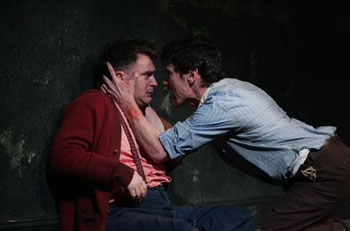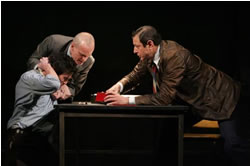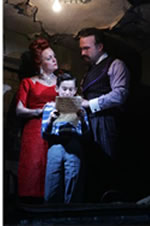
Profound Pathologies: A Defense of The
Pillowman
By Jonathan Kalb
The Pillowman
By Martin McDonagh
The Booth Theatre
222 W. 45th St.
Box office: (212) 239-6200
In April, Martin McDonagh's The Pillowman
opened on Broadway to mostly favorable reviews. The judgment of
several thoughtful critics, however, has been that this play,
while clearly more ambitious than McDonagh's previous, luridly
sensationalistic work, really amounts to an empty shell. Because
the "Irish" plays that made his name traded on gratuitous brutality
and facile thriller effects, he has won huzzahs from all sides
for apparently having something to say this time--about the relationship
between creativity and violence. Nevertheless, Caridad Svich,
in her essay on HotReview.org,
says "there is something hollow at the heart of this play." Michael
Feingold writes in the Village Voice that the play merely
"dabbl[es] its toes at the edge of an ocean of big ideas"; its
comically non-realistic totalitarian setting is evidence of a
weak imagination and its central drama of two brothers merely
"a curious case."
Most prominently, Charles Isherwood, in
a New York Times essay urging 2005 Tony Award voters
to choose John Patrick Shanley's Doubt over The Pillowman
for Best Play (which they ultimately did), writes that McDonagh's
work has "a hollow, inhuman quality." "Truths, of any kind, are
not actually being explored in it," he says. "Look behind the
diverting façade of his vivid, sardonic writing, and no real insights
emerge." Isherwood denounces what he sees as McDonagh's callous
disregard for insight per se, seeing in the play a "teasing manifesto
proclaiming meaninglessness as a prime virtue in entertainment."
Even its fans would concede that The
Pillowman is an infuriating and sometimes repellent creation.
It uses contradiction and sarcasm to pose very tough questions
about our appetites and assumptions about art and artists. It
may not be easy or straightforward but it is lucid, searching
and anything but hollow. Its twists and complications, its games
with truth, even its trendy sensationalism and nihilism, are all
in the service of larger and more important aims. As to whether
McDonagh himself understands all his play's depths, that is immaterial.
Any strong text--from Shakespeare to Chekhov to Kafka--knows more
than its author, holds meanings its author didn't deliberately
insert like measured ingredients, and it's not always necessary
for decades or centuries to pass for that to become evident.
For anyone who doesn't know by now, The
Pillowman is about a writer named Katurian Katurian Katurian
(played by Billy Crudup) who says he doesn't believe literature
should have any social purpose, coded or explicit: "I say if you've
got a political axe to grind . . . go write a fucking essay .
. . The first duty of a storyteller is to tell a story." He has
been arrested because some ghoulish murders of children in his
town bear striking similarities to his lurid, and mostly unpublished,
stories. As he and his brain-damaged brother Michal (Michael Stuhlbarg)
are interrogated, with comic brutality, by a sardonic, bickering
good cop/bad cop team named Tupolski (Jeff Goldblum) and Ariel
(Zeljko Ivanek), the audience hears a handful of the stories and
multiple versions of the brothers' background--some enacted in
marvelous, cartoonish, Victorian-flavored vignettes on a platform
upstage.
 McDonagh
is as interested in interrogation and storytelling as in terror
in this work. Knowing he will be executed, Katurian wants only
to save his stories (and, at first, his brother), whereas the
cops want the truth about the child-murders, or at minimum a confession.
One has the feeling that the prime reason McDonagh set the action
in a totalitarian state was to give the cops the plausible option
of shooting Katurian with impunity at any time. This circumstance
is darkly funny. Since neither Katurian nor the cops seem to take
his execution fully seriously, it's never clear from moment to
moment what's truly fearful and what's mock-fearful in the prison.
Fear is just an atmospheric backdrop to the amusingly improbable
circumstances, which treat the product of a lowly writer--art--as
a threat comparable to terrorism. The actual focus is on the writer
and the interrogators as his reader-critics.
McDonagh
is as interested in interrogation and storytelling as in terror
in this work. Knowing he will be executed, Katurian wants only
to save his stories (and, at first, his brother), whereas the
cops want the truth about the child-murders, or at minimum a confession.
One has the feeling that the prime reason McDonagh set the action
in a totalitarian state was to give the cops the plausible option
of shooting Katurian with impunity at any time. This circumstance
is darkly funny. Since neither Katurian nor the cops seem to take
his execution fully seriously, it's never clear from moment to
moment what's truly fearful and what's mock-fearful in the prison.
Fear is just an atmospheric backdrop to the amusingly improbable
circumstances, which treat the product of a lowly writer--art--as
a threat comparable to terrorism. The actual focus is on the writer
and the interrogators as his reader-critics.
Katurian's principal audience before his
arrest was his retarded brother, to whom he had read his stories
aloud. The interrogating cops, having found and read his manuscripts,
are his new audience. In a diabolical irony, the loving brother
turns out to be the more depraved reader. Locked up alone with
Katurian, Michal admits to the child-murders. His prime response
as a reader, then, has been to commit copycat violence (or so
he says), and he recommends that Katurian burn most of his stories
as a prophylactic measure for the future: "it wouldn't take long
weeding out the ones that aren't gonna make people go
out and kill kids, 'cos you've only got about two that aren't
gonna make people go out and kill kids, haven't ya?"
The cops, for their part, also find the
stories sick even though they spend their days torturing and executing
people, activities with documented methods and procedures in their
world (as in certain parts of ours). As state-sanctioned murderers,
their job is evidently to maintain the state's monopoly on violence;
they fancy themselves as indignant deputies of social decency.
They aren't quite philistines--sardonic Tupolski has writerly
ambitions himself--but they do sometimes come off as figures for
the sort of literal-minded readers who can't handle irony or ambiguity
and who try to pin authors down to settled purposes and meanings.
This point becomes pivotal when the interrogation turns into a
literary debate, with Tupolski opining about what qualifies as
funny and sick, Ariel reviling even imaginary violence ("You know
what? I would torture you to death just for writing a
story like that"), and Katurian refusing all responsibility beyond
"telling a story."
In this way, the play sets up a deadly
figural stalemate: the bloody-minded artist committed to unfettered
indulgence of the imagination (and swelled with his arrogant integrity),
versus the hypocritically bloodthirsty public (represented by
Michal and the cops) bent on blaming the artist for society's
antisocial impulses and craven tastes. Intelligent people can
reasonably disagree about The Pillowman's sickening details,
but this central conflict is rich and resonant--a cheeky contribution
to a longstanding debate about the artist's responsibility to
society that reaches back to Romanticism, censorship through the
ages, and Plato's beef with poets in The Republic.
From the very first story of Katurian's
told in the play--about razor blades hidden inside carved applemen--McDonagh
broadcasts his Tarantinoesque predilections, stretching the envelope
of what his audience will tolerate. This first tale, merely summarized,
is seriously disturbing and regularly prompts walkouts, despite
the scene's comic undertone. It places viewers on the emotional
defensive, despite fascinating them like steaming dung or fresh
road kill. Guilty pleasure thus becomes part of the discomfort
of the play, as it does in Tarantino and Oliver Stone's better
films. Why censure McDonagh, then, for employing an attraction/repulsion
dynamic that has been part of our culture for decades?
In fact, The Pillowman tucks powerful
ideas into its sensationalism. The play takes aim at venerable
romantic clichés about the benefits of suffering for artists.
Katurian tells several stories about his parents, whom he says
he murdered when he was 14 after discovering their macabre scheme
to make him into a great writer by exposing him (for 7 years)
to the screams of his brother, imprisoned and tortured in an adjacent,
secret room. In the version of events that Katurian writes,
oddly enough, he doesn't kill his parents and only years later
discovers his tortured brother's corpse along with a sweet and
gentle story by him, "better than anything he himself had ever
written," which he burns.
 The
specter of these deliberately abusive parents--oblivious to anything
other than artistic cultivation--packs a huge emotional wallop
in the theater, evoking universally familiar shibboleths about
stiff upper lips and chins up. The two-story composite portrait
of the artist as a young victim, however, is the enduring point
of fascination. Its implication is that Katurian and his well-meaning,
pathological parents believe (exaggerating an ethos of the entire
post-Romantic era) that talent means exposure and openness to
dark thoughts. Superior beauty, it seems, needn't itself be dark
(since the better story is sweet and gentle), but the dead brother's
greater talent suggests that real horrible experience is better
artistic training than imagined horrible experience. Listening
to screams isn't enough.
The
specter of these deliberately abusive parents--oblivious to anything
other than artistic cultivation--packs a huge emotional wallop
in the theater, evoking universally familiar shibboleths about
stiff upper lips and chins up. The two-story composite portrait
of the artist as a young victim, however, is the enduring point
of fascination. Its implication is that Katurian and his well-meaning,
pathological parents believe (exaggerating an ethos of the entire
post-Romantic era) that talent means exposure and openness to
dark thoughts. Superior beauty, it seems, needn't itself be dark
(since the better story is sweet and gentle), but the dead brother's
greater talent suggests that real horrible experience is better
artistic training than imagined horrible experience. Listening
to screams isn't enough.
What, exactly, is McDonagh saying about
the apprenticeship of the victim-artist? Nothing more or less
than Conrad, Baudelaire, Dostoyevsky, Genet and every other modern
author who has introduced creatively criminal protagonists and
explored the possibility that barbarism may be inherent in civilization.
In their fine 2003 book Crimes of Art + Terror, Frank
Lentricchia and Jody McAuliffe trace this tradition, quoting Wordsworth's
assessment that modern people suffer from a "savage torpor" out
of which they need to be shocked. McDonagh is confronting (in
Lentricchia and McAuliffe's words) the "sentimentality that asks
us to believe that art is always somehow humane and humanizing,
that artists, however indecent they might be as human beings,
become noble when they make art, which must inevitably ennoble
those who experience it." Surely the ambition to explode this
cliché needs no defending in the age of the erudite Unabomber,
the author-murderer Jack Henry Abbott, and the composer Karlheinz
Stockhausen's remark that the twin tower attacks were "the greatest
work of art that is possible in the whole cosmos."
McDonagh does want people to ponder who
is responsible for the violence Katurian's stories incite, to
consider whether some sort of "bottom line" ought to exist in
art beyond which distasteful artistic medicine should be considered
poison (are the artists with us or with the terrorists?). He just
has no answer to these questions, which is no doubt why his play
has elicited such mistrust. The Pillowman actually makes
something of a fetish out of open questions, and that lends it
an evasive, insincere air. Tupolski, for instance, repeatedly
lies about big and little matters, right up until the 10-point
countdown to execution that only reaches 4. Ariel bizarrely reassures
Katurian at one point, "you can certainly half-trust us." It's
impossible to take anything either cop says about the investigation
or the murders at face value. Nor is Michal wholly reliable. Now
simple-minded, now anomalously sophisticated, he confesses to
murdering three children in imitation of his brother's stories
(and is "mercifully" murdered by Katurian for it--like Lenny in
Of Mice and Men), but one of those kids then walks into
the jail (painted green--a detail from a different story), raising
doubts about whether any have really been murdered. By the same
token, it's not at all certain that Katurian really murdered his
parents as he claims. The specter of violent fantasies in children
is a dominant theme in the play, and Katurian clearly has a histrionic
side.
This is the sort of indeterminacy and deception
that Plato so abhorred. He kicked the poets out of his ideal (and
dictatorial) Republic because he considered them essentially liars,
fashioning morally questionable images from fabricated materials.
Since they wouldn't promise to depict only upright behavior or
make their ethical views plainly apparent, they were dangerous
to society--particularly one prone to sheepish imitation of the
images it consumes. Two and a half millennia later, in the age
of lip-synching, staged news, reality TV, and innumerable other
simulacra, Plato's view may seem far away, but it has remained
dear to censors, puritans, and all manner of patriarchal control
freaks through the ages. McDonagh's remarkable conception retools
that stark, ancient provocation for an ironic, spin-savvy age
now facing a crisis of confidence (in some camps, at any rate)
in its freewheeling liberal-democratic traditions. The Pillowman
has no remedy in its pocket, but it offers a terribly precise
diagnosis, with a Mephistophelian guffaw.
